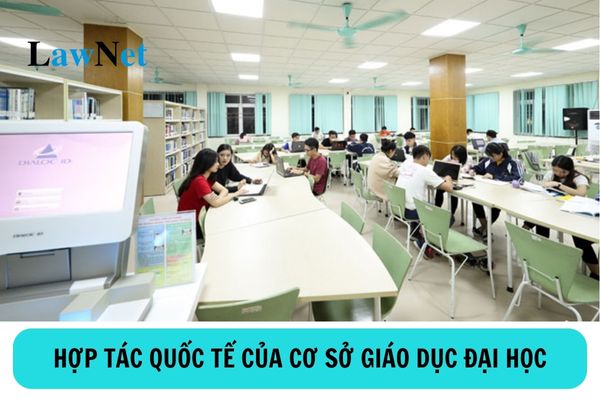What are international cooperation forms of higher education institutions in Vietnam? What are the objectives of international cooperation activities of higher education institutions?
Forms of International Cooperation for Higher Education Institutions in Vietnam
Pursuant to Article 44 of the Law on Higher Education 2012, the forms of international cooperation for higher education institutions include:
- Educational partnerships.
- Establishing representative offices of foreign higher education institutions in Vietnam.
- Collaborating in scientific research and technology transfer, organizing scientific conferences and seminars.
- Consulting, sponsoring, investing in the development of infrastructure, and equipment.
- Training, exchanging lecturers, researchers, management staff, and students.
- Networking libraries, exchanging information for educational, scientific, and technological activities; providing training programs; exchanging publications, materials, and outcomes of educational, scientific, and technological activities.
- Participating in regional and international educational, scientific, professional organizations.
- Opening representative offices of Vietnamese higher education institutions abroad.
- Other forms of cooperation as regulated by law.

What are international cooperation forms of higher education institutions in Vietnam? What are the objectives of international cooperation activities of higher education institutions? (Image from the Internet)
Objectives of International Cooperation of Higher Education Institutions in Vietnam
Pursuant to Article 43 of the Law on Higher Education 2012, the objectives of international cooperation of higher education institutions are:
- Enhancing the quality of higher education towards modernization, approaching advanced higher education in the region and globally.
- Creating conditions for higher education institutions to develop sustainably, train a high-level and qualified workforce to serve the cause of industrialization and modernization of the country.
Regulations on Training Association with Foreign Parties for Higher Education Institutions in Vietnam
Pursuant to Article 45 of the Law on Higher Education 2012 as amended by Clause 25, Article 1 of the Amended Law on Higher Education 2018, the regulations on training association with foreign parties for higher education institutions are as follows:
- Educational partnership with foreign institutions involves cooperation between a higher education institution established in Vietnam and a foreign higher education institution to implement training programs for awarding degrees or certificates, without forming a new legal entity.
The educational partnership with foreign institutions must ensure compliance with the regulations of the Education Law 2019 and other relevant legal provisions.
- The joint training program with foreign institutions may be a foreign program or a program jointly developed by both parties. The training may be conducted entirely in Vietnam or partially in Vietnam and partially abroad.
- Foreign higher education institutions involved in educational partnerships with Vietnamese higher education institutions must be reputable, quality institutions authorized by competent authorities of the respective country to conduct education and award degrees in the partnership field, or hold a valid quality assurance certification issued by a legitimate education quality assurance organization.
The partners in the educational partnership must ensure conditions regarding infrastructure, equipment, and faculty to meet the requirements of the training program; and be responsible for the quality of the training program.
- The Minister of Education and Training approves the educational partnership projects with foreign institutions for teacher training programs, health sector training programs after consultation with related ministries and central authorities; and the partnership projects of higher education institutions not covered by Clause 5, Article 45 of the Law on Higher Education 2012.
- Higher education institutions meeting the conditions stipulated in Article 45 of the Law on Higher Education 2012 and Clause 2, Article 32 of the Law on Higher Education 2012 have the autonomy to engage in undergraduate training partnerships;
Upon meeting the quality assurance standards for undergraduate training programs, they are authorized to engage in master's degree training partnerships in suitable fields;
Upon meeting the quality assurance standards for undergraduate and master's degree training programs, they are authorized to engage in doctoral training partnerships in suitable fields.
- In cases where the foreign partnership training program is suspended or terminated due to non-compliance with the conditions stipulated in Clause 3, Article 45 of the Law on Higher Education 2012, the higher education institution must:
+ Ensure the lawful interests of lecturers, employees, and students;
+ Compensate tuition fees for students;
+ Settle payments for teaching services, and other entitlements of lecturers and employees as per signed employment contracts or collective labor agreements;
+ Settle tax debts and other debts (if any).
- Higher education institutions must publicly disclose information related to the foreign partnership training program, the legal status of the foreign degrees awarded in the issuing country and in Vietnam on the institution’s website and mass media;
Support students in the process of accrediting foreign higher education degrees; conduct quality assurance evaluations of the partnership training program in Vietnam immediately after graduation of students and as per the prescribed cycle.
- Higher education institutions that engage in partnership training without ensuring the stipulated conditions or violating quality assurance conditions within the partnership training project with foreign institutions, will be suspended from partnership activities and will not be authorized to engage in partnership training with foreign institutions for a period of 05 years, from the date the competent authority’s findings on violations become effective.

